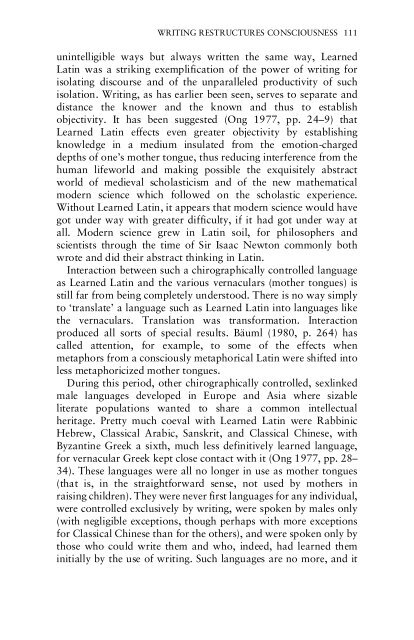Orality and Literacy: The Technologizing of the Word - Monoskop
Orality and Literacy: The Technologizing of the Word - Monoskop
Orality and Literacy: The Technologizing of the Word - Monoskop
You also want an ePaper? Increase the reach of your titles
YUMPU automatically turns print PDFs into web optimized ePapers that Google loves.
WRITING RESTRUCTURES CONSCIOUSNESS 111<br />
unintelligible ways but always written <strong>the</strong> same way, Learned<br />
Latin was a striking exemplification <strong>of</strong> <strong>the</strong> power <strong>of</strong> writing for<br />
isolating discourse <strong>and</strong> <strong>of</strong> <strong>the</strong> unparalleled productivity <strong>of</strong> such<br />
isolation. Writing, as has earlier been seen, serves to separate <strong>and</strong><br />
distance <strong>the</strong> knower <strong>and</strong> <strong>the</strong> known <strong>and</strong> thus to establish<br />
objectivity. It has been suggested (Ong 1977, pp. 24–9) that<br />
Learned Latin effects even greater objectivity by establishing<br />
knowledge in a medium insulated from <strong>the</strong> emotion-charged<br />
depths <strong>of</strong> one’s mo<strong>the</strong>r tongue, thus reducing interference from <strong>the</strong><br />
human lifeworld <strong>and</strong> making possible <strong>the</strong> exquisitely abstract<br />
world <strong>of</strong> medieval scholasticism <strong>and</strong> <strong>of</strong> <strong>the</strong> new ma<strong>the</strong>matical<br />
modern science which followed on <strong>the</strong> scholastic experience.<br />
Without Learned Latin, it appears that modern science would have<br />
got under way with greater difficulty, if it had got under way at<br />
all. Modern science grew in Latin soil, for philosophers <strong>and</strong><br />
scientists through <strong>the</strong> time <strong>of</strong> Sir Isaac Newton commonly both<br />
wrote <strong>and</strong> did <strong>the</strong>ir abstract thinking in Latin.<br />
Interaction between such a chirographically controlled language<br />
as Learned Latin <strong>and</strong> <strong>the</strong> various vernaculars (mo<strong>the</strong>r tongues) is<br />
still far from being completely understood. <strong>The</strong>re is no way simply<br />
to ‘translate’ a language such as Learned Latin into languages like<br />
<strong>the</strong> vernaculars. Translation was transformation. Interaction<br />
produced all sorts <strong>of</strong> special results. Bäuml (1980, p. 264) has<br />
called attention, for example, to some <strong>of</strong> <strong>the</strong> effects when<br />
metaphors from a consciously metaphorical Latin were shifted into<br />
less metaphoricized mo<strong>the</strong>r tongues.<br />
During this period, o<strong>the</strong>r chirographically controlled, sexlinked<br />
male languages developed in Europe <strong>and</strong> Asia where sizable<br />
literate populations wanted to share a common intellectual<br />
heritage. Pretty much coeval with Learned Latin were Rabbinic<br />
Hebrew, Classical Arabic, Sanskrit, <strong>and</strong> Classical Chinese, with<br />
Byzantine Greek a sixth, much less definitively learned language,<br />
for vernacular Greek kept close contact with it (Ong 1977, pp. 28–<br />
34). <strong>The</strong>se languages were all no longer in use as mo<strong>the</strong>r tongues<br />
(that is, in <strong>the</strong> straightforward sense, not used by mo<strong>the</strong>rs in<br />
raising children). <strong>The</strong>y were never first languages for any individual,<br />
were controlled exclusively by writing, were spoken by males only<br />
(with negligible exceptions, though perhaps with more exceptions<br />
for Classical Chinese than for <strong>the</strong> o<strong>the</strong>rs), <strong>and</strong> were spoken only by<br />
those who could write <strong>the</strong>m <strong>and</strong> who, indeed, had learned <strong>the</strong>m<br />
initially by <strong>the</strong> use <strong>of</strong> writing. Such languages are no more, <strong>and</strong> it

















